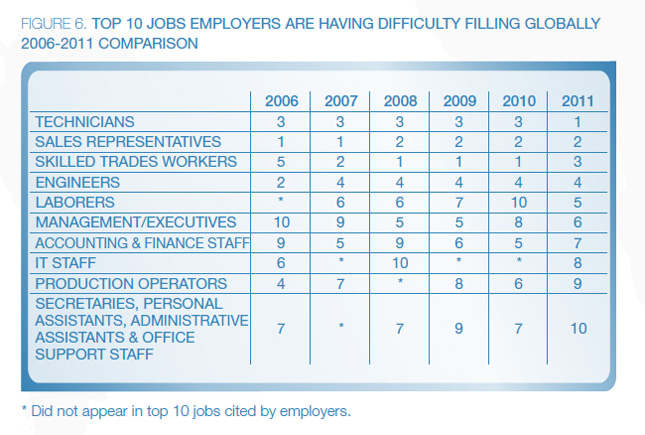 A favorite quote among training professionals is one from Zig Ziglar, “What’s worse than training your workers and losing them? Not training them and keeping them.”
A favorite quote among training professionals is one from Zig Ziglar, “What’s worse than training your workers and losing them? Not training them and keeping them.”
How appropriate for our industry! The ManpowerGroup’s 2011 Talent Shortage Survey lists “skilled trades” as one of the top 10 in demand jobs and the most difficult to fill. You can look back to previous surveys and one of the top 10 occupations listed every year is skilled trades workers. (See chart below from page 6 of the report.)
In addition, construction, manufacturing, retail and technology industries are all competing for the same workforce which makes training no longer up for discussion or debate if we want to stay competitive. Quite simply, our survival depends upon it.
Our industry needs a shared vision created by all stakeholders: owners, general contractors, sub-contractors, trade associations and suppliers. This vision must include an attractive career path and a sustainable pipeline of young folks entering the industry. Providing quality craft training to our workforce makes good sense. Having training and credentials portable makes even more sense if you think about the mobility of the segment of our workforce that we are trying to attract.
In many areas of the country, the industrial construction “industries’ owner councils” have created industry-wide training standards compliant with PSM (Process Safety Management) regulated by OSHA. These initiatives have provided for standardization and certification throughout the crafts which has solved the problem of training and re-training when an individual moves from one project or company to the next.
The commercial construction industry must not wait for legislation to fix the problems with our industry. Kicking the issue down the road for the next generation to solve has only created a more critical skills shortage that will become apparent as the economy recovers. Unless we address the training issue, we are likely to discover that not only have we lost a large number of experienced craft professionals to retirement, but also we have lost many who have left the workforce or moved to other industries.
What happens if we train our folks and they leave us? What happens if we don’t train them and they stay?
Why Should I Train My Employees?
by Katrina Kersch | October 25, 2011



Add new comment